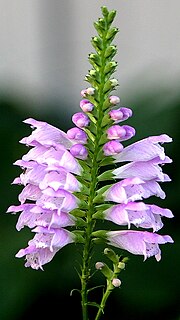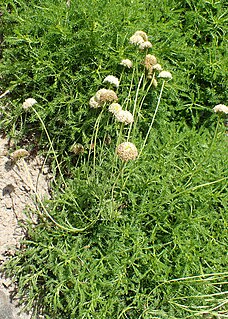
The Royal Horticultural Society (RHS), founded in 1804 as the Horticultural Society of London, is the UK's leading gardening charity.

Petunia is genus of 20 species of flowering plants of South American origin. The popular flower of the same name derived its epithet from the French, which took the word petun, meaning "tobacco," from a Tupi–Guarani language. An annual, most of the varieties seen in gardens are hybrids.

Grevillea is a diverse genus of about 360 species of evergreen flowering plants in the family Proteaceae, native to rainforest and more open habitats in Australia, New Guinea, New Caledonia, Sulawesi and other Indonesian islands east of the Wallace Line. It was named in honour of Charles Francis Greville, an 18th century patron of botany and co-founder of the Royal Horticultural Society. The species range from prostrate shrubs less than 50 cm (20 in) tall to trees 35 m (115 ft) tall. Common names include grevillea, spider flower, silky oak and toothbrush plant. Closely related to the genus Hakea, the genus gives its name to the subfamily Grevilleoideae.

Lavandula stoechas, the Spanish lavender or topped lavender (U.S.) or French lavender (U.K.), is a species of flowering plant in the family Lamiaceae, occurring natively in several Mediterranean countries, including France, Spain, Portugal, Italy and Greece.

Scabiosa caucasica, the Caucasian pincushion flower, pincushion-flower or Caucasian scabious, is a species of flowering plant in the family Caprifoliaceae, native to the Caucasus, north eastern Turkey, and northern Iran. Growing to 60 cm (24 in) tall and broad, it is a clump-forming perennial with divided leaves. Pincushion-shaped buds, borne on erect stems, open to pale blue or lavender flower heads, 8 cm (3 in) in diameter, from late summer through to autumn.

Lavandula angustifolia, formerly L. officinalis, is a flowering plant in the family Lamiaceae, native to the Mediterranean. Its common names include lavender, true lavender or English lavender ; also garden lavender, common lavender, and narrow-leaved lavender.
Chirita was an Old World genus of the flowering plant family Gesneriaceae, native to Indo-Malaysia, S. E. Asia, and southern China. In 2011, the species in the genus were reassigned to several genera, with the type species assigned to the genus Henckelia, so that Chirita became a synonym, no longer recognized.

Physostegia virginiana, the obedient plant, obedience or false dragonhead, is a species of flowering plant in the mint family, Lamiaceae. It is native to North America, where it is distributed from eastern Canada to northern Mexico. Physostegia are known commonly as obedient plants because a flower pushed to one side will often stay in that position. The name “false dragonhead” refers to the dragonheads of the related Dracocephalum, a genus to which the plant once belonged.

Cuphea hyssopifolia, the false heather, Mexican heather, Hawaiian heather or elfin herb, is a small evergreen shrub native to Mexico, Guatemala and Honduras.

Symphyotrichum cordifolium, commonly known as common blue wood aster, blue wood-aster or heartleaf aster, is a herbaceous perennial plant in the family Asteraceae native to eastern North America.

Santolina chamaecyparissus, known as cotton lavender or lavender-cotton, is a species of flowering plant in the family Asteraceae, native to the western and central Mediterranean.

Grevillea lavandulacea, commonly known as lavender grevillea, is endemic to south-eastern South Australia and western and central Victoria.

Lavandula dentata, fringed lavender or French lavender, is a species of flowering plant in the family Lamiaceae, native to the Mediterranean, the Atlantic islands and the Arabian peninsula. Growing to 60 cm (24 in) tall, it has gray-green, linear or lance-shaped leaves with toothed edges and a lightly woolly texture. The long-lasting, narrow spikes of purple flowers, topped with pale violet bracts, first appear in late spring. The whole plant is strongly aromatic with the typical lavender fragrance.

Celtica gigantea, commonly called giant feather grass, giant needle grass, or golden oats, is a species of flowering plant in the grass family Poaceae, native to southern Europe. It occurs in Spain and other Mediterranean countries. It is still widely referenced in the horticultural literature under its synonym Stipa gigantea.

Primula marginata, the silver-edged primrose, is a species of flowering plant in the family Primulaceae, native to the European Alps. It is an evergreen or semi-evergreen perennial growing to 15 cm (5.9 in) tall by 30 cm (12 in) broad, with rosettes of leathery serrated leaves, and stalks bearing umbels of slightly scented lavender flowers in spring. Parts of the plant, including the edges of the leaves, may be covered by a mealy-white bloom, hence the Latin and common names.

Microchirita is a genus of flowering plants in the family Gesneriaceae, subfamily Didymocarpoideae.

The Didymocarpoideae are a subfamily of plants in the family Gesneriaceae. It was formerly the subfamily Cyrtandroideae. This subfamily consists mostly of tropical and subtropical Old World genera, found in Africa, Asia and the Pacific. One species is native to Central and South America.

Thalictrum rochebruneanum, called the lavender mist meadow rue, is a species of flowering plant in the genus Thalictrum, native to the Korean Peninsula and Japan. A clumping perennial topped with a loose spray of small medium violet flowers with yellow stamens, and sometimes reaching 2 m (7 ft), it has gained the Royal Horticultural Society's Award of Garden Merit.

Santolina pinnata, called lavender cotton along with other members of its genus, is a species of flowering plant in the family Asteraceae, native to northwest Italy. Its putative subspecies Santolina pinnata subsp. neapolitana, the rosemary-leaved lavender cotton, has gained the Royal Horticultural Society's Award of Garden Merit.



















